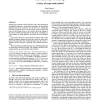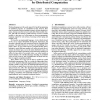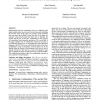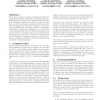ICFP
2005
ACM
14 years 11 months ago
2005
ACM
We present a new approach to the old problem of adding side effects to purely functional languages. Our idea is to extend the language with "witnesses," which is based o...
ICFP
2005
ACM
14 years 11 months ago
2005
ACM
Writing loops with tail-recursive function calls is the equivalent of writing them with goto's. Given that loop packages for Lisp-family languages have been around for over 2...
ICFP
2005
ACM
14 years 11 months ago
2005
ACM
Existing languages provide good support for typeful programming of standalone programs. In a distributed system, however, there may be interaction between multiple instances of ma...
ICFP
2005
ACM
14 years 11 months ago
2005
ACM
We have designed, implemented, and evaluated AtomCaml, an extension to Objective Caml that provides a synchronization primitive for atomic (transactional) execution of code. A fir...
ICFP
2005
ACM
14 years 11 months ago
2005
ACM
We explore partial type-inference for System F based on type-containment. We consider both cases of a purely functional semantics and a call-by-value stateful semantics. To enable...
ICFP
2005
ACM
14 years 11 months ago
2005
ACM
Current languages allow a programmer to describe an interface only by enumerating its parts, possibly including other interfaces wholesale. Such languages cannot express relations...
ICFP
2005
ACM
14 years 11 months ago
2005
ACM
Implementing first-class continuations can pose a challenge if the target machine makes no provisions for accessing and re-installing the run-time stack. In this paper, we present...
ICFP
2005
ACM
14 years 11 months ago
2005
ACM
A limited form of dependent types, called Generalized Algebraic Data Types (GADTs), has recently been added to the list of Haskell extensions supported by the Glasgow Haskell Comp...
ICFP
2005
ACM
14 years 11 months ago
2005
ACM
We propose an aspect-oriented programming (AOP) language called Aspectual Caml based on a strongly-typed functional language Objective Caml. Aspectual Caml offers two AOP mechanis...
ICFP
2005
ACM
14 years 11 months ago
2005
ACM
module is a programming abstraction that simultaneously generalizes -abstractions, records, and mutually recursive definitions. Although various mixin module type systems have bee...




